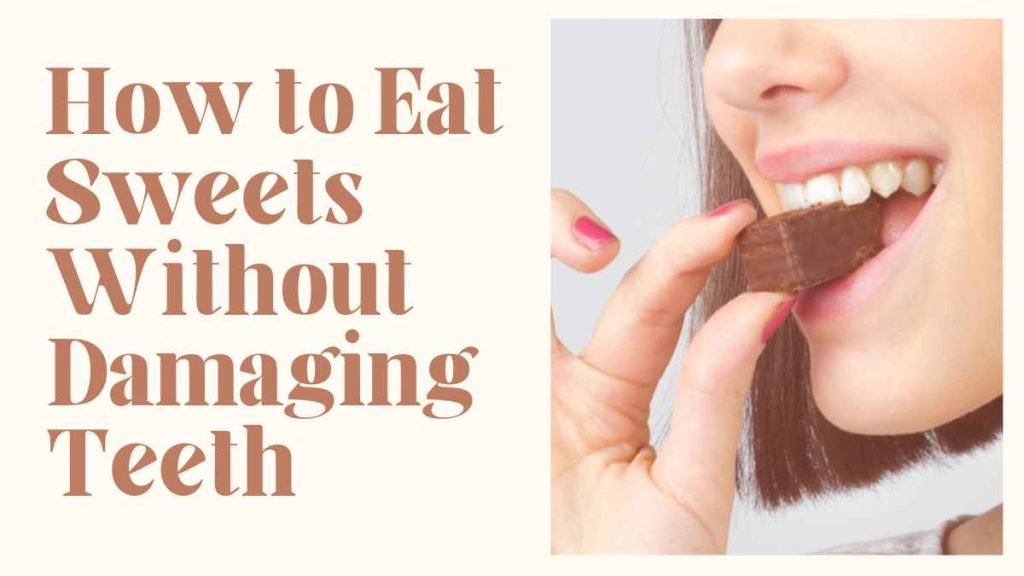How to Eat Sweets Without Damaging Teeth! Indulging in sweets is a delightful experience that many of us enjoy. The sugary delights often make our taste buds dance with joy. However, the downside to this sugary pleasure is the potential damage it can cause to our teeth. Fear not! In this comprehensive guide, we will explore How to Eat Sweets Without Damaging Teeth. Here we will explore the reasons why sweets can damage teeth, provide a step-by-step guide on how to enjoy them without harming your dental health, discuss common mistakes to avoid, and share some valuable tips and tricks.
Table of Contents
Why Sweets Damage Teeth?
Before we delve into the ways to enjoy sweets without causing harm, it’s essential to understand why sugary treats can be detrimental to our dental health. When we consume sweets, the sugar interacts with the bacteria in our mouths, creating acid. This acid attack erodes tooth enamel, leading to cavities and tooth decay.
How to Eat Sweets Without Damaging Teeth: A Step-by-Step Guide
Here you can check the step-by-step guide about How to Eat Sweets Without Damaging Teeth:
Total Time: 10 minutes
Choose Wisely: Opt for Tooth-Friendly Sweets
Not all sweets are created equal. Opt for sweets that are less sticky and dissolve quickly in the mouth, such as dark chocolate, sugar-free candies, and fresh fruits.
Timing Matters: Consume Sweets with Meals
Enjoy your sweets as part of a meal rather than snacking on them throughout the day. During meals, the increased saliva production helps wash away sugary residue and neutralizes acids, reducing the risk of tooth damage.
Practice Good Oral Hygiene: Brush and Floss Regularly
Maintaining a robust oral hygiene routine is crucial. Brush your teeth at least twice a day with fluoride toothpaste and floss daily to remove leftover food particles and plaque. Consider using a mouthwash containing fluoride for added protection.
Rinse Your Mouth: After Eating Sweets, Rinse with Water
After indulging in sweets, rinse your mouth thoroughly with water. Swishing water in your mouth helps wash away residual sugar and acid, reducing the risk of tooth decay.
Avoid Sweets Before Bed: Protect Your Teeth While You Sleep
Avoid consuming sweets right before bedtime. Saliva production decreases during sleep, making it easier for harmful acids to attack your teeth. If you must indulge, ensure it’s well before your bedtime routine.
Details on Avoiding Damaging Teeth and Eating Sweets
Choosing Tooth-Friendly Sweets: A Closer Look
When selecting sweets, opt for those without added sugars or artificial sweeteners. Fresh fruits, particularly crunchy ones like apples and pears, can naturally cleanse your teeth as you chew. Additionally, sugar-free gum with xylitol stimulates saliva production, which helps wash away acids and protect your teeth.
Mealtime Strategy: Sweets as Desserts
Integrate sweets into your meals as desserts rather than standalone snacks. Enjoying sweets alongside a balanced meal reduces the exposure time of your teeth to sugar and acids, minimizing the risk of dental damage.
Oral Hygiene Routine: The Foundation of Healthy Teeth
Regular brushing and flossing are your first line of defense against tooth damage. Use a soft-bristled toothbrush and fluoride toothpaste to clean all surfaces of your teeth. Don’t forget to clean your tongue and gums too. Flossing helps remove plaque and food particles from between your teeth, where your brush can’t reach.

Common Mistakes to Avoid
Overindulging: Moderation is Key: While enjoying sweets is fine, overindulgence can lead to excessive sugar exposure, increasing the risk of tooth decay. Exercise moderation and limit your sweet intake to specific times of the day.
Neglecting Oral Hygiene: Skipping Brushing and Flossing: Skipping your oral hygiene routine, especially after consuming sweets, leaves sugar and acids lingering in your mouth. This neglect can lead to cavities and gum issues. Be consistent with your dental care regimen.
Ignoring Dental Checkups: Regular Visits to the Dentist: Regular dental checkups are crucial for maintaining oral health. Dentists can detect early signs of dental problems and provide professional cleaning to remove stubborn plaque and tartar, ensuring your teeth stay healthy.
Tips and Tricks
Sugar-Free Alternatives: Explore the Variety: Explore the wide range of sugar-free sweets and desserts available in the market. Many of these treats use natural sweeteners or sugar alcohols, providing a satisfying sweetness without harming your teeth.
Use a Straw: Minimize Contact with Teeth: When indulging in sugary beverages, use a straw to minimize direct contact with your teeth. This reduces the exposure of your tooth enamel to sugar, helping to mitigate the risk of cavities.
Chew Sugar-Free Gum: Stimulate Saliva Production: Chewing sugar-free gum, particularly those containing xylitol, stimulates saliva production. Saliva helps wash away acids and sugars, neutralizing the harmful effects on your teeth.
Facts About Eating Sweets Without Damaging Teeth
Saliva is Your Natural Defender: Saliva plays a significant role in protecting your teeth. It contains minerals like calcium and phosphate, which remineralize tooth enamel and strengthen your teeth, counteracting the effects of acid attacks.
Tooth Decay is Preventable: With proper oral care and mindful sweet consumption, tooth decay is entirely preventable. By following a healthy oral hygiene routine and making wise choices about sweets, you can maintain a radiant smile.
Conclusion
In conclusion of How to Eat Sweets Without Damaging Teeth, indulging your sweet tooth without compromising your dental health is entirely possible with the right approach. By choosing tooth-friendly sweets, practicing good oral hygiene, avoiding common mistakes, and following useful tips and tricks, you can savor your favorite treats without the worry of damaging your teeth. Remember, moderation and mindful consumption are the keys to enjoying sweets while keeping your smile bright and healthy. Here you can checkout that How to Eat Lemons Without Damaging Teeth.
FAQs About How to Eat Sweets Without Damaging Teeth
Q1: Can I still enjoy chocolates without harming my teeth?
Yes, you can enjoy chocolates, especially dark chocolate with higher cocoa content. Dark chocolate contains less sugar and is less sticky, making it a better choice for your dental health.
Q2: Are natural sweeteners like honey and maple syrup better for teeth than refined sugar?
While natural sweeteners have some nutritional benefits, they can still contribute to tooth decay. It’s essential to consume them in moderation and practice good oral hygiene.
Q3: Is it okay to brush my teeth immediately after eating sweets?
It’s best to wait for about 30 minutes after consuming sweets before brushing your teeth. Brushing immediately after can potentially damage softened tooth enamel due to acid attacks.
Q4: Are sugar-free candies entirely safe for teeth?
Sugar-free candies, especially those sweetened with xylitol, are a safer option for teeth. However, moderation is key, as excessive consumption can still lead to digestive issues.
Q5: How often should I visit the dentist for a checkup?
Regular dental checkups are recommended every six months. However, consult with your dentist to determine the frequency based on your individual oral health needs.
Q6: Can chewing sugar-free gum replace brushing and flossing?
While sugar-free gum can stimulate saliva production and help clean your mouth, it’s not a substitute for proper brushing and flossing. Maintain a consistent oral hygiene routine for optimal dental health.
Q7: Are there specific fruits that are better for dental health?
Crunchy fruits like apples and pears can naturally cleanse your teeth as you chew. They also stimulate saliva production, which helps wash away sugars and acids, promoting oral health.


